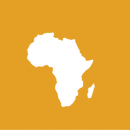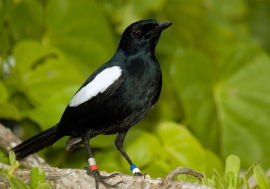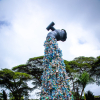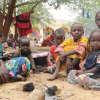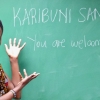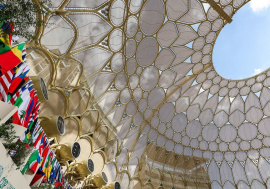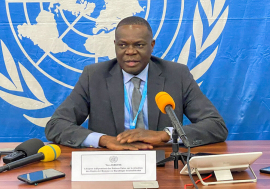Dr. Nirmal Shah, head of Nature Seychelles - an environmental conservation organization - in the Seychelles spoke to African Renewal on the challenges facing global biodiversity. His insights and experiences are a glimmer of hope as the world charts a new nature pathway, the Global Biodiversity Framework. Here are excerpts:

Africa Renewal: At what point did you realize that nature and conservation were your passions?
Dr. Shah: It was very early on, when I was about six- or seven-years old, because my father was a very keen naturalist, historian, folklorist, photographer, collector of all things Seychelles and a pioneer of conservation.
Who triggered and influenced your journey into conservation?
My father. He was interested in conservation at a time when very few, if any, Seychellois were. I met and even went out in the field with scientists who came to Seychelles in the 1960s and early 70s.
My father also had a tremendous library. I spent much of my spare time there when we were not out free diving on the reefs collecting marine mollusks, which was a passion of his, or hiking in the mountains.
For decades, you have advocated for open-frontiers conservation, placing international teams with local practitioners and communities in the lead on conservation and learning from nature. What has been the motivation?
Seychelles is the motivation. It is an amazing and incredible piece of the planet that continues to inspire and motivate, despite all the challenges. It’s always a team effort and in my case, multidisciplinary teams.
I have sought experts from all over the world to work on the projects. I have facilitated partnerships with people as varied as veterinarians, social marketers, ornithologists, land planners, educators, business professionals, well-to-do individuals and even youth groups.
I believe that the more diversity we have in our workforce collaborating with local people, the better we are at innovation and delivering lasting results.
Conservation should not have borders. I have a word I use, “global”. Global to local.

World leaders are meeting in Montreal, Canada, this week with a critical task of shaping a global biodiversity framework to halt nature and ecosystems degradation, as well as safeguarding species from extinction for the next decade. As a frontline conservation practitioner, do you have any thoughts to share?
Conservation without money is just conversation. The planet is in such dire straits that conversation must cease. Conservation action is needed. The funding gap has been estimated to be billions of dollars; but let us not kid ourselves. Millions, even billions, of dollars have been spent, but only a small percentage of that reaches the grassroots where I am. This is not an opinion; the abject failure of all the Aichi Targets [ambitious set of global goals aimed at protecting and conserving global biodiversity] speaks for itself.
So, let us cut through the smoke and mirrors of environmental social governance, impact investing, blended finance and those other financial buzzwords that are bandied around.
Let’s get the UN Decade on Ecosystem Restoration underway by ensuring that financial and technical support reaches where they are needed—where species, ecosystems and people are being directly affected—and by putting local champions at the tip of the spear.
From your experience, how has environmental conservation evolved over the decades? What is the future of conservation, considering the twin crises of climate and biodiversity loss?
I am optimistic about conservation because of my personal and institutional successes. We need immense concerted efforts to move agenda to action, knowing to doing and identification to implementation.
What do birds tell us about impacts of humans on biodiversity and climate change?
Science has proven that birds are excellent indicators of ecosystem health. In fact, we restored entire islands to receive endemic bird populations that led to natural rewilding by insects and other invertebrates, reptiles and sea birds.
Most of the bird extinctions in modern times have taken place on islands. Our work, using the combination of birds and islands in Seychelles, is an antidote to all the doom and gloom. It demonstrates that we can achieve conservation of highly threatened species and their habitats in our lifetime.
It is heartwarming to see the discussions on the biodiversity framework speaking of “nature-positive” and “nature-based solutions” because that is where we were in 2002.
Birds have taught us a lot about climate and environment. They exist within the larger ecosystem, and we now realize that to save birds we had to save everything else.
This includes the marine environment, where recent research shows that restoring terrestrial island ecosystems also benefits coral reefs. It influenced our change of name from Birdlife Seychelles to Nature Seychelles. That was exactly 20 years ago.

After securing and restoring biodiversity and bird populations, you have moved to other projects, such as large-scale restoration of coral reefs, locally managed marine areas and new conservation technologies. What keeps you going?
For me, conservation is life—the rest is detail. Seychelles is my passion. They are the most beautiful islands in the world, teeming in endemic biodiversity but being damaged by development and climate change. That’s the motivation.

